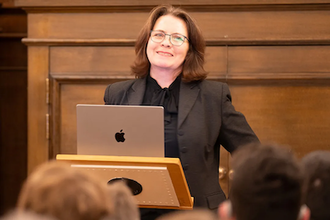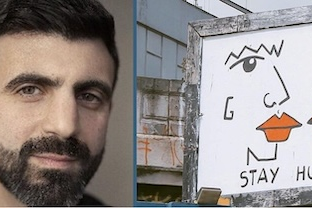How to do justice

Jenny Sinclair at the Do Justice launch
Jenny Sinclair is Founder and Director of Together for the Common Good, She spoke last month at Caritas Social Action Network's launch of 'Do Justice' - their new resource for spiritual and civic renewal - in the London Jesuit Centre. Here is an slightly edited version of that talk.
Justice. We all have an idea what that means. But there are different visions of justice. To understand our own tradition we need to go back to the source.
Jesus was a common worker in a Roman economy that kept down the wages of the poor.
His resistance to that injustice was rooted in the rabbinical tradition where the meaning of justice is about right relationship. His justice took spiritual as well as civic form. He introduced people to the Kingdom. He introduced a whole new way of living, bringing people together - rich and poor, across ethnicity, age and sex, educational background and across class - we could say to build a common good.
This element of relationship runs right through the themes of biblical justice. Did you know the meaning of lending money in Hebrew - kesef talve - is close to "accompaniment"? In God's economy, if you're having a hard time, I'm to walk in relationship with you - accompany you until you get back on your feet - for as long as it takes.
The Catholic social justice tradition is anchored in God's economy of mutual obligation and right relationship. As Pope Paul VI said we are to help people become "artisans of their own destiny." Catholic social justice rests on the threefold cornerstones of human dignity, solidarity and subsidiarity. And ours is a transcendent vision of justice, where human beings are in relationship with each other and with God.
To interpret this justice tradition in our own time, we have the "see, judge, act" method.
But how do we see, how do we judge and how do we act? These how questions are about social, political and economic choices. To make the right choices, we must be anchored in our tradition, or we're at risk of mission drift.
Currently shaping our world there are two secular visions of justice:
- the utilitarian, focusing on welfare, is currently conjoined with
- the libertarian, focusing on rights and freedom from constraint - based on a false idea of freedom
- This combination is what underpins our current operating system - the sea in which we swim. As a method of how to do justice, this utilitarian/libertarian combination is utterly different from our own transcendent, relational tradition. This is important because when we Christians forget our own tradition, the risk is we can inadvertently prop up those secular choices - whether utilitarian, welfarist or libertarian.
So let's go back to see, judge, act.
How do we see what's going on, from a Christian justice perspective?
The Catholic Social Teaching tradition helps us understand the world. It's based on Christian anthropology and rooted in natural law - where human beings are relational beings who thrive in relationship with each other and with God. These transcendent, relational fundamentals underpin our model of justice. This is the frame for how we see what's going on. The Catholic Social Teaching framework calls us to look at what is happening to human beings, to families, communities, relationships - to God's creation.
So in this new time, what do we see?
We see many examples of loving kindness, community and interdependence, of human beings doing their thing. But we also see this is coming under increasing threat. We see injustice. We see a system generating pockets of intense wealth but also poverty and civic degradation on a vast scale. We see five million of our fellow citizens on out of work benefits and fourteen million living in poverty. We see a succession of economic crises. We see work becoming precarious, housing becoming unaffordable, the discarding of whole sections of society.
We see the dehumanisation and the exploitation of human beings in euthanasia, the liberalising of abortion, in sexual exploitation. We see the commodification and "financialisation" of everything: land, water, homes, human beings. We see the concentration of power and the weakening of local agency. We see catastrophic damage to the natural world. We see division, isolation and fragmentation, symptoms of human distress, relationship breakdown, family breakdown, falling levels of trust, a mental health crisis.
For those who live in pockets of affluence, this damage may be invisible. But those in poor areas see it more clearly. What you see depends on where you stand.
So how do we judge what we see?
Catholic Social Teaching is our framework for good judgement. Correctly understood, it is nonpartisan and equips us to call out any system - whether capitalist or collectivist - or whatever system that is dehumanising. From its analysis of political economy, we can judge that our prevailing operating system is broken. We can judge that it causes human degradation, vast inequality, the weakening of families. It weakens virtues like responsibility and mutual obligation. It reframes them as outdated. It undermines our justice cornerstones of human dignity, solidarity and subsidiarity. Effectively it's an assault on relationship.
If we really are seeing clearly, we can judge that this operating system generates what I would call a politics of abandonment. If we think of our population as one body, then the body is broken. Not just here either. Every country that's adopted this system is seeing the same thing. So, we can begin to understand this unholy alliance of this utilitarian-welfarist state-market collusion that attempts to mitigate the multiple forms of poverty that it generates, produced by its libertarian-neoliberal economy. It's not only unjust, it's defeatist. It's an inefficient vicious cycle, dysfunctional. And it's unstable: the so-called "cost of living crisis" is just one of many crises that this system generates.
So, we need to focus on system reform, not just on mitigating the effects of its dysfunction.
And so as Christians we do need to be careful. We must argue for essential needs to be met - imperative of course - but if we don't frame that within a bigger story of system failure, we can inadvertently become enablers of an unjust system, even repress prophetic justice.
But it's not just about the economy. The logic underpinning this low wage, high welfare economic model has moral, social and spiritual consequences too. Its logic leads governments to overcentralise power and to collude with big business to coerce and control, going above and around democratic processes, undermining human agency.
So we can judge that we have, what Pope Francis calls, a "malign" culture. He says it's dehumanising, unjust. He says it's doing great damage, especially to the young and to the poor. In this malign culture, it's no coincidence that we see steep rises in loneliness, statistically higher, by the way, among the young than the old.
We're living through a period of accelerated social, moral and political confusion.
So from the position of our relational, transcendent justice tradition, we can judge that this operating system is anti-human. Pope Francis is right to say this is not just an era of change but a change of era. The truth is we don't know what the new era will bring. Which is why how we respond is so important. But amidst all this, as Christians, we know God is at work. That's our hope. We don't deal in false hope. We tell the truth to power, in faith and in love.
Remember Catholic Social Teaching began as a response to a moment of seismic change, the Industrial Revolution. And it can guide again us now.
We're called to see, to judge, but also to act. To shine a light on the philosophy underpinning these dark systems. But also to promote the way of God's Kingdom. And consistent with subsidiarity, we are all called to take responsibility at the appropriate level: the person, the family, the neighbourhood, the local, the regional, the governmental, the international.
At the level of statecraft, we're called to propose a political economy consistent with our tradition. And in practice, what does this mean?
It means decentralising the banks. Decentralising the energy providers. It means the dignity of work - insisting on work, we must not capitulate to a workless future. It means investment for jobs and skills training in the abandoned places. It means distributing power and assets. It means enabling that thick layer of healthy civil society institutions which can resist the dominance of capital and state power. It means building a common good between capital and labour, between finance and production.
And the local level involves us all directly. We must strengthen each other through partnership and mutual encouragement - churches, religious institutions, schools, unions, clubs, guilds, local businesses, associations, charities. Our justice tradition of right relationship - it cuts through every level. It invites all of us to be relational.
So our acts of justice involve listening to each other, and to the Holy Spirit. This involves dialogue, robust deliberation, repentance, redemption, forgiveness and reconciliation. These are the gifts that we can bring.
And for parishes and charities, it means proactively living in solidarity with poor communities through real relationships, accompanying people to get on their feet. It means cultivating their leadership. The poor are meant to be the treasure of the Church.
Pope Francis goes further. He says the Church needs to be evangelised by the poor. Because someone who is poor has a sense of their need for others and for God - an instinct for interdependence that the affluent and the busy so easily lose. This reciprocity is the great mystery at the heart of God's special love for the poor. This is why Pope Francis says we must stop outsourcing and take personal responsibility. He says solutions are not to be found in activism or welfarism. He says it's personal. He's actually explicit - he says we are to share our table.
This is challenging, isn't it, for "social action", and for the service provider posture as we currently know it. Francis is calling us to relationship; to leave behind that divisive benefactor-recipient dynamic. To refuse the idolatry of "the Christian volunteer as rescuer." Think about it. Instead, he says we are to build relationship with people who are poor; not as recipients, but as neighbours and friends. Our tradition of relational justice, God's economy, underpins our prophetic witness - and a proper, holistic understanding of evangelisation!
We are to look for opportunities where everything becomes "an occasion for communion" with our neighbours. We are meant to be building a common good. This is the path to spiritual and civic renewal.
LINKS
Full talk available at: https://togetherforthecommongood.co.uk/from-jenny-sinclair/how-to-do-justice
The 'Do Justice' launch event also heard presentations from CSAN's chief executive Raymond Friel, and Sir John Battle, CSAN trustee.
Do Justice Campaign at www.dojustice.co.uk
Do Justice for Parishes: https://dojustice.co.uk/wp-content/uploads/2024/02/Do-Justice-For-Parishes.pdf
Do Justice for Schools: https://dojustice.co.uk/wp-content/uploads/2024/02/Do-Justice-For-Schools.pdf


















